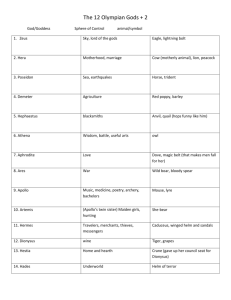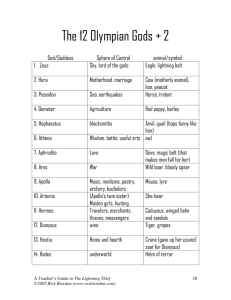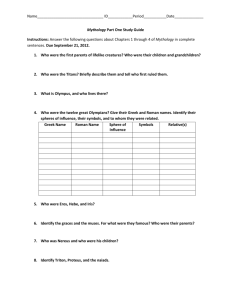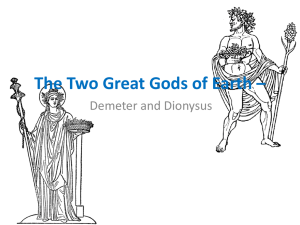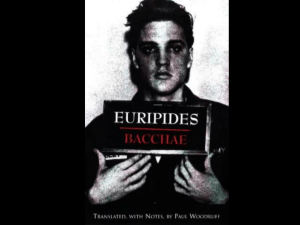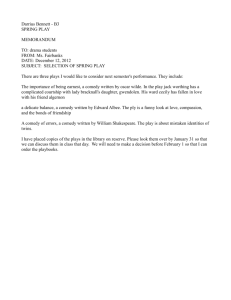Frogs - University of Warwick
advertisement
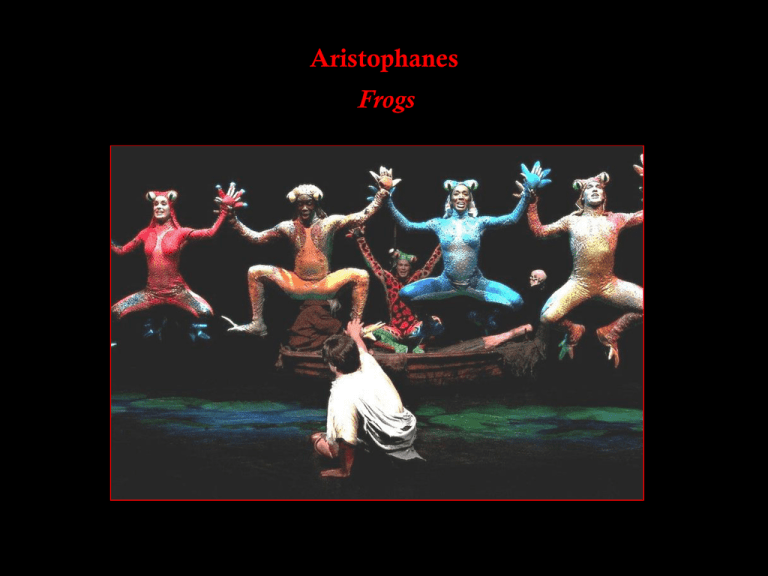
Aristophanes Frogs The Politics of Laughter “Truth and good are not to be laughed at. This is why Christ did not laugh. Laughter foments doubt … With his laughter the fool says in his heart ‘Deus non est’” Jorge in Umberto Eco’s The Name of the Rose (1980) What is the function of laughter? Attic (Athenian) comedy Komoidia: from komos “revel, merry-making, festival” + aoidos “singer, poet” (from aeidein “to sing”). Like tragedy, it was produced at civic festivals – under the auspices of the state – and within a competitive event. •The Lenaea (January) and the City Dionysia (March). •5 comedies staged at each festival (or sometimes 3). Each comedy by different playwright. •Prize awarded for best comedy; sometimes also for best comic actor. Attic (Athenian) comedy OLD COMEDY (5TH century BC) •3 or 4 actors, sometimes supported by silent supernumeraries. •A chorus of 24 men (the tragic chorus was 12 or 15 strong). •Plays frequently titled after chorus (Frogs, Wasps, Birds). •Crude language. Jokes about sex and shitting. •Costumes reflect subject matter: grotesque masks, body padding; for male characters, a large leather phallus. •Typical plot: hero embarks upon a crazy, impossible scheme. •Mythology plundered for material but treated irreverently. Often parodied. •Plenty of topical allusions and commentary. References to – and satire of – major events and to prominent citizens of the day, who are mocked or parodied. •The comedies of Aristophanes are the only complete comic plays to survive from the 5th century BC. How far does serious social comment lie behind the jokes? Old Comedy Terracotta comic actors, Greek, late 5th–early 4th century BCE. Metropolitan Museum of Art. Attic (Athenian) comedy NEW COMEDY (c.323–c.263 BC) •No topical satire. Instead, fictional plots based on contemporary life. •Plot revolves around the tribulations of young lovers caught up among stock characters (the miserly father, the boastful soldier). •Chorus reduced to a musical interlude. •Chief exponent: Menander. Aristotle on Comedy “Comedy aims at representing men as worse, tragedy as better than in actual life” Comedy “originated with the authors ... of the phallic songs” (sung at the festivals of Dionysus). “Comedy is, as we have said, an imitation of characters of a lower type – not, however, in the full sense of the word bad, the ludicrous being merely a subdivision of the ugly. It consists in some defect or ugliness which is not painful or destructive. To take an obvious example, the comic mask is ugly and distorted, but does not imply pain.” Comic mask, 5th century BC Later Theories of Comedy 1. SUPERIORITY: laughter is an expression of our superiority. Thomas Hobbes, Leviathan (1651): “The passion of laughter is nothing else but sudden glory arising from some sudden conception of some eminency in ourselves, by comparison with the infirmity of others, or with our own formerly” 2. RELIEF: release of (excess) tension and energy. See Herbert Spencer, “The Physiology of Laughter” (1860) and Sigmund Freud, Jokes and Their Relation to the Unconscious (1905) Laughter helps someone to “blow off steam”. Comic catharsis? 3. INCONGRUITY: the upsetting of expectation or assumption. Surprise. Immanuel Kant, Critique of Judgment (1790): “In everything that is to excite a lively laugh there must be something absurd (in which the understanding, therefore, can find no satisfaction). Laughter is an affection arising from the sudden transformation of a strained expectation into nothing.” NB. THESE THEORIES DON’T HAVE TO BE MUTUALLY EXCLUSIVE. Bergson: Comedy as Corrective Henri Bergson, “Laughter: An Essay on the Meaning of the Comic” (1900). “Beyond actions and attitudes that are automatically punished by their natural consequences, there remains a certain inflexibility of the body, of the mind and of the character that society would like to eliminate to obtain a greater elasticity and a better sociability of its members. This inflexibility is the comic, laughter is the punishment.” Incongruity: human habit (the mechanical) vs. human intelligence (the spiritual) Superiority: comedy as punishment for behaviours not conducive to social life and social betterment. Means of ensuring “elasticity” – adaptability. Aristophanes, Frogs Won first prize at the Lenaea in 405. Unusual in having two choruses: •The chorus of Initiates of the Eleusinian Mysteries: believed to lead a blissful, toil-free existence in the afterlife. •The titular frogs, who are the secondary chorus. Did it appear onstage? Plot: play divided into two halves. 1)Dionysus – the patron god of tragedy – journeys to Hades, the underworld, to retriveve the dead Euripides. 2)Contest in Hades for the “throne of tragedy”: between Euripides and Aeschylus. Comic Techniques in the first half of Frogs Parody •Parody of the katabasis myth: the descent into the underworld (think Orpheus and Eurydice). •Mythology and the gods sent up: Dionysus is a weak, cowardly, conceited. Disguised (badly) as the hero Heracles. This involves… Incongruity and absurdity •Dionysus dressed as Heracles: “A lion skin over a yellow negligee! What’s going on? Why the high-heeled boots? Why the club?” (135) •Contrast between Dionysus (dressed like Heracles) and Heracles early in the play. Dionysus and Heracles in the 2004 Broadway production of Stephen Sondheim’s The Frogs Comic Techniques in the first half of Frogs The Double Act •Dionysus and his servant Xanthias: a classic comedy double act. The master and servant an important one in Western comic tradition. XANTHIAS Shush! What that noise? DIONYSUS [panicking] Where’s it coming from? XANTHIAS It’s somewhere behind us. DIONYSUS Here, let me go in front. XANTHIAS No, it’s in front of us. DIONYSUS Actually, why don’t you go first? (145) Comic Techniques in the first half of Frogs The Double Act •Dionysus and his servant Xanthius: a classic comedy double act. The master and servant an important one in Western comic tradition. XANTHIAS Shush! What that noise? DIONYSUS [panicking] Where it coming from? XANTHIAS It’s somewhere behind us. DIONYSUS Here, let me go in front. XANTHIAS No, it’s in front of us DIONYSUS Actually, why don’t you go first? (145) Role Swapping •Before the doors of the palace of Pluto. •Terrified by Aeacus, Dionysus convinces Xanthias to exchange role. Then Persephone’s maid comes out to offer a friendly (and sexual) greeting to “Heracles”. Dionysus insists on swapping back. Then two landladies enter to accost “Heracles” for eating them out of house and home the last time he visited Hades. Dionysus swaps again. (52-6) Comic Techniques in the first half of Frogs Puns and Linguistic Play •E.g. Zeus/Juice. Dionysus associated with wine. DIONYSUS: Anyway, it’s an absolute outrage that I, Dionysus, son of Juice, have to struggle along on foot… (134) Physical Comedy •Good examples: Xanthias’s difficulty with the luggage; Dionysus and Xanthias joining the dance of the initiates; when Aeacus (one of the judges of the dead) beats the bottoms of Dionysus and Xanthias with a rope to determine which is a god. Comic Techniques in the first half of Frogs Crude Humour •Overlaps, of course, with physical comedy – and also puns and the double act. [Aeacus goes back into the palace. Dionysus collapses to the ground in terror.] XANTHIAS What are you doing down there? DIONYSUS Oh no! My bowel is empty. Call on the god! XANTHIAS Stand up! Somebody might see you. DIONYSUS I feel faint. Give me a sponge. [Xanthias extracts a sponge from one of the bags.] Press it on my heart, there’s a good chap. XANTHIAS There you go. DIONYSUS No, here. That’s it. XANTHIAS The heart’s slipped a bit, hasn’t it? DIONYSUS What? Of, yes – the sudden shock. It’s taken refuge in my … lower intestine. XANTHIAS [realizing what has happened within Dionysus’ clothing] O most cowardly of men and gods. (153) Comic Techniques in the first half of Frogs Crude Humour •About humiliation. Superiority theory? •Remember, this is a god: incongruity? Carnivalesque and the Body Mikhail Bakhtin, Rabelais and His World, trans. by Helene Iswolsky (Bloomington: Indiana University Press, 1984): •“Festive laughter”: temporary destabilization or inversion of power structures. •“In grotesque realism ... the bodily element is a deeply positive one … The body discloses its essence as a principle of growth which exceeds its own limits only in copulation, pregnancy, childbirth, the throes of death, eating, drinking, or defecation. This is the ever unfinished, ever creating body…” Comic Techniques in the first half of Frogs Acknowledging and insulting the audience • comedy and metatheatricality DIONYSUS XANTHIAS DIONYSUS Any sign of those murderers and perjurers he told us about? Use your eyes, sir. [looking towards the audience] Oh, yes, I see them now. (145) Second half of Frogs: the agon AESCHYLUS (OLD) EURIPIDES (NEW) PATRIOTIC “works imbued with martial spirit” (173) RADICAL “I pray to other gods.” (168) GRAND STYLE Euripides calls it “a torrent of verbiage, stiffened with superlatives and padded out with pretentious polysyllables” (166) MORE COLLOQUIAL STYLE Aeschylus: “a concatenation of commonplaces” (166-7) THE IDEAL “My heroes weren’t like these marketplace loafers, delinquents and rogues they write about nowadays. They were real heroes…” (172) THE EVERYDAY “I wrote about everyday things, things the audience knew about and could take me up on if necessary. I didn’t try to bludgeon them into submission with long words…” (171) HEROISM FOR A SOCIETY AT WAR “I depicted valour … encouraging the audience to identify with these heroes when the call to battle came” (173-4) DRAMA AS RADICAL DEMOCRACY “As soon as the play began I had everyone hard at work. No one would stand idle. Women, slaves, the master, the young maiden, the old crone – they all talked … It was democracy in action” (170) TEACHES AUDIENCE TO BE BETTER CITIZENS “Schoolboys have a master to teach them, adults have poets.” (174) TEACHES AUDIENCE TO BE SCEPTICAL “What I did was to teach the audience to use its brains” (171) Second half of Frogs: the agon Shakespeare vs. George Bernard Shaw inSondheim’s The Frogs The Political Context of Frogs Battle of Arginusae (406 BC) •Peloponnesian War (431-404 BC). Athens and allies versus Sparta. •At Arginusae, Athenians defeat Sparta, but victory is marred by failure to rescue survivors from wrecked ships. Up to 5,000 men lost. •Athens controlled by a group of radical democrats. They try and execute 6 of the 8 commanders at Arginusae. •They gain further power by freeing and granting citizenship to all slaves who fought for Athens at Arginusae. These democrat leaders include Cleophon and Theramenes, both attacked in Frogs (154, 160). Many of Aristophanes’s earlier plays had satirized another democrat – Cleon (also mentioned in Frogs). Charon tells Xanthias: “I don’t take slaves. Not unless they fought in the seabattle” (140). After hearing Aeschylus retell the story of Oedipus, Dionysus ironically declares: “Better to have been an Athenian commander at Arginusae!” (179) The parabasis • The point in Greek comedy when the chorus is left alone onstage to address the audience directly. • Reported that Frogs earned an unprecedented second production because of the advice offered in its parabasis: it does not seem right When slaves who helped us in a single fight Now vote beside our allies from Plataea And put on masters’ clothes, like Xanthias here … But if we’re going to treat these men as brothers, Let’s be consistent and excuse the others. … We need those loyal kinsmen on our side. (160) • Note the political reading of role changing. • Calls for the return from exile of the statesmen involved in the oligarchic revolution of 411 BC. • Advises a return of the old: “How about one of the old gags, sir? I can always get a laugh with those.” (133) The Politics of Drama: “I need a poet.” The choice between Aeschylus and Euripides is a political one. Dionysus states “I need a poet” (136) at the outset. By the second part of the play, this need has become political rather than personal: “I came down here for a poet. What for? To save the city, of course!” (187) Drama central to civic life in Athens, to the functioning of democracy. Dionysus ends the contest by posing two questions: 1. “what should be done about Alcibiades?” (187) •Alcibiades: Athens’s greatest general and statesmen. In exile and had defected to Sparta for a time (413-12). Had returned in 407-6 only to go into exile again. Should he be brought back to save the day? 2. “I want each of you to tell me how you think the city can be saved.” (188) The Politics of Drama: “I need a poet.” Euripides is clever but not clear in his advice. Aeschylus, unsurprisingly, states that “The navy is the city’s strength” (188) Dionysus finally chooses Aeschylus. Unsurprising, given that Aristophanes shows a preference of the “old ways” and that his plays frequently satirizes Euripides. See esp. The Women at the Thesmophoria (411 BC): the women of Athens plot to kill Euripides, indignant at how they are represented in his plays. But… neither poet’s emerged from this contest unscathed. Audience as judges. Aristophanes gives us time to decide. “I don’t know how to judge between them. I don’t want to make an enemy of either. One’s so wise, and the other I just love.” (187) Who goes? You decide. The Politics of Laughter (again) “Truth and good are not to be laughed at. This is why Christ did not laugh. Laughter foments doubt … With his laughter the fool says in his heart ‘Deus non est’” Jorge in Umberto Eco’s The Name of the Rose (1980) Is laughter subversive? Doesn’t Frogs suggest that comedy is a means of reinforcing truth rather than undermining it? Northrop Frye, Anatomy of Criticism (1957) “Just as there is a catharsis of pity and fear in tragedy, so there is a catharsis of the corresponding comic emotions, which are sympathy and ridicule, in Old Comedy. The comic hero will get his triumph whether what he has done is sensible or silly, honest or rascally. Thus Old Comedy, like the tragedy contemporary with it, is a blend of the heroic and the ironic.” (42-3) Bibliography Aristotle, Poetics, trans. Richard Janko (Indianapolis: Hackett, 1987). Bakhtin, Mikhail, Rabelais and His World, trans. by Helene Iswolsky (Bloomington: Indiana University Press, 1984). Freud, Sigmund, Jokes and their Relation to the Unconscious, trans. James Strachey (London: Routledge & Kegan Paul, 1960). First pub. 1905. Frye, Northrop, Anatomy of Criticism: Four Essays (Princeton University Press, 1957). Golden, Leon, “Aristotle on Comedy,” The Journal of Aesthetics and Art Criticism, 42.3 (1984), 283-90. Hobbes, Thomas, Leviathan, ed. J. C. A. Gaskin (Oxford: Oxford University Press, 2008). First pub. 1651. Kant, Immanuel, Critique of Judgment, trans. James Creed Meredith (Oxford: Oxford University Press, 2007). First pub. 1790. Spencer, Herbert, “The Physiology of Laughter,” in Macmillan's Magazine (March 1860).
